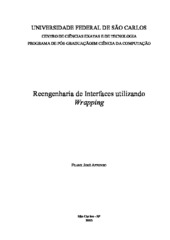| dc.contributor.author | Affonso, Frank José | |
| dc.date.accessioned | 2016-06-02T19:05:18Z | |
| dc.date.available | 2004-11-13 | |
| dc.date.available | 2016-06-02T19:05:18Z | |
| dc.date.issued | 2003-09-05 | |
| dc.identifier.citation | AFFONSO, Frank José. Reengenharia de interfaces utilizando Wrapping.. 2003. 136 f. Dissertação (Mestrado em Ciências Exatas e da Terra) - Universidade Federal de São Carlos, São Carlos, 2003. | por |
| dc.identifier.uri | https://repositorio.ufscar.br/handle/ufscar/321 | |
| dc.description.abstract | With the technological evolution and the increasing utilization of the Internet, companies and governmental institutions have been looking for modern solution to replace and improve their legacy systems. These kind of solutions require high investments, being able to use the reengineering process in these cases. A maner to modify these systems is through reengineering of their interfaces, by wrapping of their logic. This technique preserves the native environment of system and its functionalities, reducing in time and cost the reengineering process. To support the migration of legacies systems in a general way, there is an Interface Reengineering Process (IRP), whose accomplish the wrapping of its functionalities and connect them with a new user Web interface. This Web interface connects itself with the identified components of the legacy system following the special resources that they offer. The IRP is summarized by the study of the interface and logic of the system. In this way, it possible to accomplish the system organization for the wrapping to be done, which is composed by the legacies functionalities covered by a new software layer. This new layer makes possible the communication with the new user interface, which has developed according to the usability criteria. The systems used as case studies were developed using Delphi environment, with or without object orientation characteristics. In this work only systems developed without object orientation characteristics are presented in details. With the use of the new process proposed here, the interface can be developed in any paradigm, while the legacy code remains as the original, simplyfing the system maintenance. | eng |
| dc.format | application/pdf | por |
| dc.language | por | por |
| dc.publisher | Universidade Federal de São Carlos | por |
| dc.rights | Acesso Aberto | por |
| dc.subject | Engenharia de software | por |
| dc.subject | Reengenharia de interfaces | por |
| dc.subject | Sistema legado | por |
| dc.subject | Componentes de software | por |
| dc.subject | Técnicas de empacotamento | por |
| dc.subject | World Wide Web (sistema de recuperação da informação) | por |
| dc.subject | Usabilidade | por |
| dc.subject | Camada de software | por |
| dc.subject | Interface reengineering | eng |
| dc.subject | Wrapping technique | eng |
| dc.subject | Legacy systems | eng |
| dc.subject | Usability | eng |
| dc.subject | Software layer | eng |
| dc.subject | Software component | eng |
| dc.subject | Web | eng |
| dc.title | Reengenharia de interfaces utilizando Wrapping. | por |
| dc.type | Dissertação | por |
| dc.contributor.advisor1 | Penteado, Rosângela Aparecida Dellosso | |
| dc.contributor.advisor1Lattes | http://lattes.cnpq.br/4061946080136286 | por |
| dc.description.resumo | Com a evolução tecnológica e com a crescente utilização da Internet, empresas e instituições governamentais desejam migrar seus sistemas desenvolvidos com recursos computacionais antigos (legados) para mais modernos. No entanto, essa é uma tarefa que requer investimentos elevados, podendo o processo de reengenharia ser utilizado nesses casos. Uma forma de modificar esses sistemas é por meio da reengenharia da sua interface, através do empacotamento de sua lógica (wrapping). Essa técnica preserva o ambiente nativo do sistema e suas funcionalidades, reduzindo em tempo e custo o processo de reengenharia. Para apoiar a migração de sistemas legados propõe-se um Processo de Reengenharia de Interface (PRI) que apóia a migração de sistemas legados de maneira geral, realizando o empacotamento de suas funcionalidades e acoplando uma nova interface do usuário para Web. A nova interface do usuário será disponibilizada para Web, que se comunica com os componentes identificados no sistema legado de acordo com os recursos especiais que eles oferecem. O PRI resume-se no estudo da interface e da lógica do sistema. Com isso, pode-se realizar a organização do sistema para que seja realizado seu empacotamento, que corresponde ao revestimento das funcionalidades legadas por uma camada de software, viabilizando a comunicação com a nova interface do usuário, desenvolvida segundo critérios de usabilidade. Os sistemas utilizados como estudo de casos são desenvolvidos no ambiente Delphi com ou sem características da orientação a objetos. Neste trabalho somente os desenvolvidos sem características da orientação a objetos são apresentados em detalhes. Com a aplicação desse processo, somente a interface passa a ser desenvolvida em um outro paradigma, mas o código legado permanece como o original, facilitando a tarefa dos mantenedores do sistema. | por |
| dc.publisher.country | BR | por |
| dc.publisher.initials | UFSCar | por |
| dc.publisher.program | Programa de Pós-Graduação em Ciência da Computação - PPGCC | por |
| dc.subject.cnpq | CIENCIAS EXATAS E DA TERRA::CIENCIA DA COMPUTACAO | por |
| dc.contributor.authorlattes | http://genos.cnpq.br:12010/dwlattes/owa/prc_imp_cv_int?f_cod=K4771159Y6 | por |
